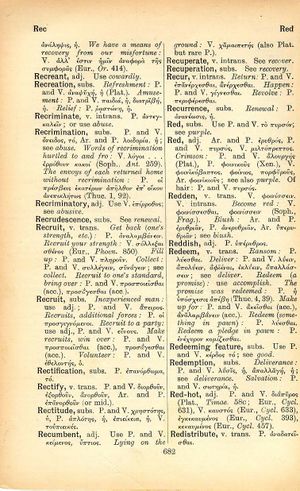recrimination: Difference between revisions
From LSJ
Δίκαιος ἐὰν ᾖς, πανταχοῦ τῷ τρόπῳ χρήσῃ νόμῳ († λαληθήσῃ) → Si iustus es pro lege tibi mores erunt → Bist du gerecht, ist dein Charakter dir Gesetz (wirst du in aller Munde sein)
(Woodhouse 4) |
(CSV4) |
||
| Line 1: | Line 1: | ||
{{ | {{Woodhouse1 | ||
| | |Text=[[File:woodhouse_682.jpg|thumb|link={{filepath:woodhouse_682.jpg}}]]'''subs.''' | ||
P. and V. [[ὄνειδος]], τό, Ar. and P. [[λοιδορία]], ἡ; see [[abuse]]. | |||
<b class="b2">Words of recrimination hurtled to and fro</b>: V. λόγοι . . . ἐρρόθουν κακοί (Soph., ''Ant.'' 259). | |||
<b class="b2">The envoys of each returned home without recrimination</b>: P. οἱ πρέσβεις ἑκατέρων ἀπῆλθον ἐπʼ οἴκου ἀνεπικλήτως (Thuc. 1, 92). | |||
}} | }} | ||
Revision as of 09:49, 21 July 2017
English > Greek (Woodhouse)
subs.
P. and V. ὄνειδος, τό, Ar. and P. λοιδορία, ἡ; see abuse. Words of recrimination hurtled to and fro: V. λόγοι . . . ἐρρόθουν κακοί (Soph., Ant. 259). The envoys of each returned home without recrimination: P. οἱ πρέσβεις ἑκατέρων ἀπῆλθον ἐπʼ οἴκου ἀνεπικλήτως (Thuc. 1, 92).

